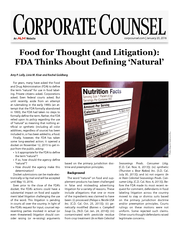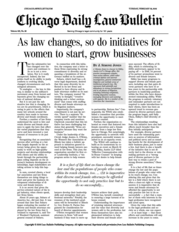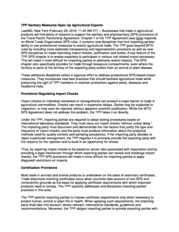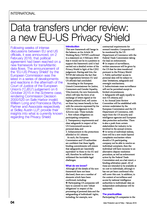As law changes, so do initiatives for women to start, grow businesses – February 23, 2016-05-23
Sidley Austin
Description
TUESDAY, FEBRUARY 23, 2016
CHICAGOLAWBULLETIN.COM
®
Volume 162, No. 36
Serving Chicago’s legal community for 161 years
As law changes, so do initiatives for
women to start, grow businesses
T
hat the substantive law
has changed over the
years and continues to
do so is not a revelation. Nor is it really
unexpected. Indeed, the law
prides itself on its ability to justly
conform to evolving ideals,
changed circumstances and technological advances.
To analogize — the law, in this
way, is similar to the military’s
movement away from horses and
bayonets given the changing nature of national defense.
But it is not just the substantive law that is changing.
So too are its practitioners, which is owing in part to the efforts that many law schools around the country have made to increase diverse and female enrollment. Further, a number of law firms understand the need to hire and retain diverse and female attorneys to apply the laws that affect the varied populations that they serve and have invested a vast amount of resources to do just that. Recognizing that an associate’s success after arriving at a law firm largely depends on the attorney being given the opportunity to work on high-quality projects and develop relationships with clients and the ability to break through the partnership glass ceiling depends on the attorney’s business development relationships, legal stakeholders are taking actions to help this happen. In sum, coveted clients, a local bar association and law firms themselves are doing things to start and grow the business development relationships of diverse and female lawyers. It is no secret that given the service-oriented nature of the legal industry, when clients speak, law firms listen. About 10 years ago, Subaru of America Inc., did just that. It was around that time that Subaru began evaluating the number of diverse and female attorneys employed by the law firms that it retained to represent it, said Terri Woodard Claybrook, assistant general counsel of Subaru. In connection with this initiative, the company sent a letter to those firms expressing its strong commitment to diversity and requesting a breakdown of the attorneys staffed on its matters. Subaru, which itself has a diverse legal department, desired that this same diversity be reflected in its law firms and pushed to have diverse and female attorneys staffed on its matters. The company wanted “diversity in thought,” “creative thinking and a richer environment” that comes with staffing diverse and female attorneys on its litigation matters. Importantly, the company’s commitment is not just lip service.
There is a separate “diversity spend” number that the company tracks and monitors. Claybrook conceded that this initiative has been challenging but states that generally “firms are receptive because they want the business.” Under the leadership of the Circuit Judge Jessica A. O’Brien, the Women’s Bar Association of Illinois has taken a holistic approach to initiatives geared toward helping female lawyers succeed at law firms. This year, the organization unveiled its first ever Leadership Institute, a “sixprogram series to help women BY J.
SIMONE JONES J. Simone Jones is a lawyer in Sidley, Austin LLP’s Chicago office. Her practice encompasses complex class-action defense, white-collar criminal defense and internal investigations, general commercial litigation and multiple areas of intellectual property law.
She represents both plaintiffs and defendants in various jurisdictions and in all phases of litigation, including initiating complaints, briefing dispositive motions, managing discovery and assisting with appeals. She is a member of the American Bar Association. to partnership. Bottom line.” Consequently, the WBAI also established a committee that provides women the opportunity to meet in-house counsel. Further, the organization cohosted an event that featured two female executives and a female partner from a large law firm here in Chicago.
Not surprisingly, the opportunity to network with prominent, successful women resulted in an at-capacity event. The WBAI will continue to build on its momentum by cohosting an event on March 16 with Sidley, Austin LLP titled “Effective Communication with In-House Counsel.” In keeping with her desire to help female It is a fact of life that as times change the law and the populations of people who come within its reach change, too. … (I)t is imperative that diverse and female attorneys be afforded the opportunity to not only practice law but to do so successfully… lawyers develop their leadership skills and strengthen their professional networks.” Notably, the resumes of the institute’s graduates will be forwarded to Illinois Lt. Gov.
Evelyn R. Pacino Sanguinetti for consideration for board of director appointments. O’Brien recognizes that women attorneys in firms “will need business if they want to move up lawyers achieve their goals, O’Brien has, herself, committed to ensuring a large turnout of inhouse counsel. Understanding the importance of retaining talented attorneys and the value that diversity and women add to the profession, law firms themselves have also implemented initiatives to help their diverse and female attor- neys succeed. The efforts of Sidley, which is celebrating its 150th anniversary, appear to be paying off — in 2016, 54 percent of its partner promotions went to diverse and female lawyers. Sidley has many programs to support diverse and female partners, including one that pairs diverse partners who have 15 or less years in the partnership with partners in leadership positions within the firm who have demonstrated rainmaking ability.
While the program is entirely voluntary and rainmaker partners are not required to make introductions to their clients, there has been an upward trend in revenue generated by diverse partners since the program began, said Sally Olson, Sidley’s chief diversity officer. The relationships resulting from this initiative have also had effects much broader than the firm initially anticipated. For example, diverse partners have used the rainmaking partners as sources of information and political savvy and as sounding boards for the development of their business plans, just to name a few. And there is also a benefit of the initiative that is not directly tied to the diverse or rainmaking partners as a “strong pool of diverse partners is the best way to retain a pool of strong diverse associates,” Olson said. It is a fact of life that as times change the law and the populations of people who come within its reach change, too. Considering this and given that the law is a field where there is not often a clear-cut right or wrong answer, it is imperative that diverse and female attorneys be afforded the opportunity to not only practice law but to do so successfully — a fact that a number of those with interests in the legal profession have recognized and acted upon. Given the value that this adds to the legal profession and society as a whole, one can expect — or at least hope — that these efforts and contributions will only increase in the years to come. Copyright © 2016 Law Bulletin Publishing Company.
All rights reserved. Reprinted with permission from Law Bulletin Publishing Company. .
So too are its practitioners, which is owing in part to the efforts that many law schools around the country have made to increase diverse and female enrollment. Further, a number of law firms understand the need to hire and retain diverse and female attorneys to apply the laws that affect the varied populations that they serve and have invested a vast amount of resources to do just that. Recognizing that an associate’s success after arriving at a law firm largely depends on the attorney being given the opportunity to work on high-quality projects and develop relationships with clients and the ability to break through the partnership glass ceiling depends on the attorney’s business development relationships, legal stakeholders are taking actions to help this happen. In sum, coveted clients, a local bar association and law firms themselves are doing things to start and grow the business development relationships of diverse and female lawyers. It is no secret that given the service-oriented nature of the legal industry, when clients speak, law firms listen. About 10 years ago, Subaru of America Inc., did just that. It was around that time that Subaru began evaluating the number of diverse and female attorneys employed by the law firms that it retained to represent it, said Terri Woodard Claybrook, assistant general counsel of Subaru. In connection with this initiative, the company sent a letter to those firms expressing its strong commitment to diversity and requesting a breakdown of the attorneys staffed on its matters. Subaru, which itself has a diverse legal department, desired that this same diversity be reflected in its law firms and pushed to have diverse and female attorneys staffed on its matters. The company wanted “diversity in thought,” “creative thinking and a richer environment” that comes with staffing diverse and female attorneys on its litigation matters. Importantly, the company’s commitment is not just lip service.
There is a separate “diversity spend” number that the company tracks and monitors. Claybrook conceded that this initiative has been challenging but states that generally “firms are receptive because they want the business.” Under the leadership of the Circuit Judge Jessica A. O’Brien, the Women’s Bar Association of Illinois has taken a holistic approach to initiatives geared toward helping female lawyers succeed at law firms. This year, the organization unveiled its first ever Leadership Institute, a “sixprogram series to help women BY J.
SIMONE JONES J. Simone Jones is a lawyer in Sidley, Austin LLP’s Chicago office. Her practice encompasses complex class-action defense, white-collar criminal defense and internal investigations, general commercial litigation and multiple areas of intellectual property law.
She represents both plaintiffs and defendants in various jurisdictions and in all phases of litigation, including initiating complaints, briefing dispositive motions, managing discovery and assisting with appeals. She is a member of the American Bar Association. to partnership. Bottom line.” Consequently, the WBAI also established a committee that provides women the opportunity to meet in-house counsel. Further, the organization cohosted an event that featured two female executives and a female partner from a large law firm here in Chicago.
Not surprisingly, the opportunity to network with prominent, successful women resulted in an at-capacity event. The WBAI will continue to build on its momentum by cohosting an event on March 16 with Sidley, Austin LLP titled “Effective Communication with In-House Counsel.” In keeping with her desire to help female It is a fact of life that as times change the law and the populations of people who come within its reach change, too. … (I)t is imperative that diverse and female attorneys be afforded the opportunity to not only practice law but to do so successfully… lawyers develop their leadership skills and strengthen their professional networks.” Notably, the resumes of the institute’s graduates will be forwarded to Illinois Lt. Gov.
Evelyn R. Pacino Sanguinetti for consideration for board of director appointments. O’Brien recognizes that women attorneys in firms “will need business if they want to move up lawyers achieve their goals, O’Brien has, herself, committed to ensuring a large turnout of inhouse counsel. Understanding the importance of retaining talented attorneys and the value that diversity and women add to the profession, law firms themselves have also implemented initiatives to help their diverse and female attor- neys succeed. The efforts of Sidley, which is celebrating its 150th anniversary, appear to be paying off — in 2016, 54 percent of its partner promotions went to diverse and female lawyers. Sidley has many programs to support diverse and female partners, including one that pairs diverse partners who have 15 or less years in the partnership with partners in leadership positions within the firm who have demonstrated rainmaking ability.
While the program is entirely voluntary and rainmaker partners are not required to make introductions to their clients, there has been an upward trend in revenue generated by diverse partners since the program began, said Sally Olson, Sidley’s chief diversity officer. The relationships resulting from this initiative have also had effects much broader than the firm initially anticipated. For example, diverse partners have used the rainmaking partners as sources of information and political savvy and as sounding boards for the development of their business plans, just to name a few. And there is also a benefit of the initiative that is not directly tied to the diverse or rainmaking partners as a “strong pool of diverse partners is the best way to retain a pool of strong diverse associates,” Olson said. It is a fact of life that as times change the law and the populations of people who come within its reach change, too. Considering this and given that the law is a field where there is not often a clear-cut right or wrong answer, it is imperative that diverse and female attorneys be afforded the opportunity to not only practice law but to do so successfully — a fact that a number of those with interests in the legal profession have recognized and acted upon. Given the value that this adds to the legal profession and society as a whole, one can expect — or at least hope — that these efforts and contributions will only increase in the years to come. Copyright © 2016 Law Bulletin Publishing Company.
All rights reserved. Reprinted with permission from Law Bulletin Publishing Company. .









